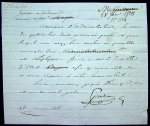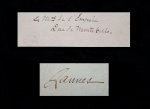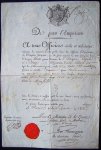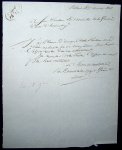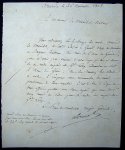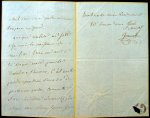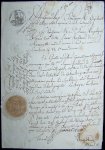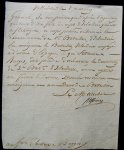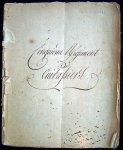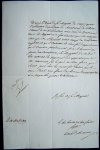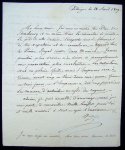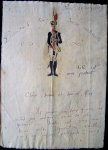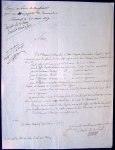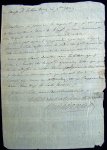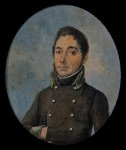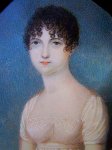My Collection – Napoleonic – 1808-1809
Marshal Joachim Murat
(1767-1815)
note: Murat was one of Napoleon’s Marshals. The document is signed Joachim and dated the 13th of January 1808.(Murat, Murat)
Marshal Jean Lannes
(1769-1809)
note: Lannes was one of Napoleon’s Marshals. On the 14th of May 1808, Lannes received the title Duc de Montebello.(Lannes, Lannes)
François Nicolas Fririon
(1766-1821)
note: Fririon was the Secretary General of the War Department and the document is dated the 8th of September 1808.(Seal, Reverse)
Marshal Louis-Alexandre Berthier
(1753-1815)
Vittoria the 7th November 1808
To his Excellency the Minister of War, Comte d’Hunebourg
I have the honour of sending your Excellency a letter extracted from my Correspondence, the object of which comes with in your responsibilities. I renew your Excellency the assurance of my highest consideration.
The Prince of Neuchatel
Major General
(Signed)
BERTHIER
note: Berthier was one of Napoleon’s Marshals. This is a document by Berthier to General Clarke the Minister of War and dated the 7th of November 1808. The document was written in Vittoria while Jean Lannes was recovering from his fall off a horse.(Berthier, Berthier, Clarke)
Marshal Louis-Alexander Berthier
(1753-1815)
Aranda the 26th November 1808
Monsieur the Marshal VICTOR
You will order the immediate arrest of Messrs. Casin and Gentil, battalion commanders and Bagnac Lieutenant, all three from the corps of Engineers, for not having executed the order which I gave them to present themselves to General Lery Commander in Chief of the Corps of Engineers. You will give them the enclosed orders, the Emperor bids you to ensure they are executed promptly, which is to say that these three officers will leave in one hour after you have given them the orders that they present themselves to General Lery. Even if these gentlemen had not received my order, they received that of General Lery which they should have obeyed.
(Signed)
BERTHIER
note: Bertheir was one of Napoleon’s Marshals. Claude Victor Perrin(1764-1841) was also a marshal under Napoleon.(Berthier, Berthier, Victor, Victor)
Madame Junot
…now I am recovering and I can return to my good friends who still love me a little. Although ill, we celebrate the birth of my daughter. I’ll write a good word to your mother if we decide to take you. It is a small assembly on the 30th of…
note: This is a private letter by Madame Junot the wife of General Jean-Andoche Junot(1771-1813) and is undated. Marshal Lannes would replace General Junot at Saragossa.(Reverse, Junot, Siege of Saragossa)
French
Ministers & Ambassadors
note: This is a document concerning diplomatic matters and dated 1809.(Reverse, Seal, Seal, Seal)
Marshal Jean-Baptiste Bessieres
(1768-1813)
note: Bessieres was one of Napoleon’s Marshals. The document while at Valladolid, Spain and dated the 8th of March 1809. It was written one day before his recall to Paris in order to take part in the Austrian Campaign. During this time he was commander of the northern provinces of Spain, and he writes to warn General Thiébault of the arrival of Irish Battalions from Flushing.(Bessieres, Bessieres, Thiébault)
5e Regiment Cuirassiers
(10 March 1809 – 14 October 1809)
“…In camp to rest the men and horses but with great privations because the villages were entirely devastated. General St. Sulpice replaced by General St. Germain. Billeted in Hauskirchen, Cötz, Nestelbach. In glorious testimony of the regiment’s part in the campaign of 1809 the Emperor bestowed 20 Légion d’Honneur .”
note: This is a journal by an officer of the 5e Regiment Cuirassiers. It describes his adventures throughout the campaign against the Austrians in 1809.
Marshal Jean Lannes
(1769-1809)
note: Lannes was one of Napoleon’s Marshals. This is a clipped piece of a document by Lannes while in Paris and dated the 10th of April 1809.(Lannes, Lannes)
Napoleon Bonaparte
(1769-1821)
note: Autograph Endorsement Signed (‘Accorde N’) on a letter addressed to him by his cabinet secretary, 1 page folio with integral blank leaf, 10 April 1809. The secretary, Edouard Mouniest, asks Napoleon to endorse the payment of 3000 francs to each of the three official translators and of 6000 francs to the English translator. Napoleon’s endorsement signifies his agreement. It is significant that the translator, M. Nettement, should receive double the pay of his colleagues. It suggests that Napoleon attached particular importance to the transation of English documents, which would have included intercepted or captured papers. The translator would also have kept the Emperor informed of English affairs from his reading of the newspapers. Although Napoleon took some English lessons on St Helena he never became proficient in the language.(Napoleon)
Louis-Guillaume Otto
(1754-1817)
Dillingen, April 22d 1809
My good friend. I received this morning your letter from Strasbourg, and at the same time the enclosed news. The joy of the latter overcomes the memory of your vexation and will console you. Today the Prince Royal enters Munich. Never has sterner punishment followed so promptly a more impudent provocation. The Austrians are in full flight, but the Emperor will reach Vienna before them. Here has thus a war ended in three days. The Emperor told the prisoners: the House of Austria has ceased ruling. Adieu, I am overwhelmed with work, but am doing excellently. A thousand kisses to you, and a thousand wishes to all those around you.
(Signed)
OTTO
note: The Second Bulletin of the Grand Army 1809 mentions a M. Otto who was with the French consulate in Bavaria.
Louis-Antoine Bourrienne
(1769-1834)
Augsbourg, 28 April 1809
“My Dear good friend. – Mr Maret has given me news from you ; he was extremely happy about your health and I needed these news all the more as, since your departure, I have only received your Strassbourg letter. Our hero left yesterday morning from Landshut to advance. To get closer to him I’ll be leaving tomorrow at dawn for Munich. This Capital has shown some remarkable patriotism, to the extent of impressing the Austrians, who did not dare lodging by the townsfolk. A courier arrived this morning from Petersbourg, bringing the news of the departure of the Garde Imperiale and the Empereur himself for Gallicia, so the struggle will open everywhere and within a month, this immense war will be over. Nobody has shown up at our Munich house and I will find all as I left it, but you won’t be there my angel, neither will my dear Sophie, and only then will I deeply feel how lonesome I am. Until now, the whirlwind of the affairs has not allowed me to think about it. Bogue left Munich 15 days ago : he has promised Mr de Hompesch to come dine with him today ; he left this morning to be true to his promise. The Royal Prince and the Bavarians fought like the French, that says it all. But despite all the victories gained, the four fifths of our army have not seen the enemy, and that army is today double of what it was on the 17th. The Garde Impériale passed through Augsbourg when eight thousand ragged Austrian prisoners were paraded there, the contrast was stunning. Maréchal Bessieres is at Braunau with Wrede, and soon 300,000 Frenchmen will be in Austria. The demon of war will be drowned in his own blood. – Austria wanted war, she’ll be sated with it, I swear to the spirits of our Ministers assassinated in Rastadt. I impatientlty await for news from you my good friend ; they will be my happiness. I only think of you and the war, and thus I find myself dealing with an angel and a devil. I kiss the angel, I hate the devil while praying to have it triumph. Lastly, I hope that that war will be the last, that humanity will be able to wipe its tears and that the London shopkeepers will dearly pay the bills of exchange they have scattered through Austria. Adieu, my sweet, my good. I kiss you a thousand times, as well as Sophie and I recall myself to the memory of the Nestor and of Miss Mar. To solace that good Mr. Jacobi, I have sent him a collection of Bulletins, that will have him cry from happiness. He’ll see that million Austrians could not resist 30,000 Bavarians. M. de Frankenstein (!) shares his feelings ; may also all my colleagues, with the exception of the Duke and Genibernat – General Andreossy is here, we meet every day – I have seen passing through Augsbourg Count Wratislaw, who brought to Munich the war declaration. He goes very modestly to Nancy as a prisonner. – So goes the world ! – The Empereur told us in Dillingen “it will be over in five days”. Indeed, on the fifth day the Great Archduke Charles started for Bohemia. He was travelling very swiftly for he had no more gun or car or luggage. Adieu ! Adieu !.My Dear good friend.
(Signed)
BOURRIENNE
note: This is a private letter by Louis-Antoine Bourrienne(1769-1834) on French advances during the campaign and dated the 28th April 1809. Bourrienne was the French envoy in Hamburg.(Bessieres, Bessieres, Andreossy)
Letter of an Infantryman
20 May 1809
Paris, May 20, 1809
Directed to my sweetness, Vernette
This is my portrait.
My dear,
There has been no shortage of all sorts of misery, but the greatest pain of all has been without a question our cruel separation that is always with me. If fate puts the temperament in their hands, they may forgive their enemies, that they also have in front of their eyes the examples of their suffering, but above all that they look at the Son of God as they pray, and ask His Father for forgiveness of his enemies.
That’s all, my dear, the end of my message.
note: The letter written in Paris by an unknown infantryman while the French were fighting in Austria.(Reverse)
Marshal Andre Massena
(1758-1817)
note: In bivouac on Lobau Island, Vienna, May 26, 1809. Massena writes to Emperor Napoleon, “request Your Imperial and Royal Majesty to reward the officers of my staff who distinguished themselves in the battle of the 21st and 22nd. For Colonel St. Croix, my aide-de-camp, the officer’s cross…” and for his other aides-de-camp “Lieutenant Renique…the rank of Captain / for Lieutenant Porcher…the rank of Captain, for Lieutenant Massena…the Legionnaire’s cross…”, as well as promotions and medals for a number of other officers.
General Pierre Decouz
(1775-1814)
note: The document concerns a soldiers service and dated the 17th of June 1809. While in Egypt Decouz would fight at the Pyramids and at Acre was Aide-de-Camp to Lannes. The General would be killed at Brienne.(Lannes, Battle of the Pyramids, Siege at Acre)
General Jean-Antoine Verdier
(1767-1839)
The 7th July 1809
Monsieur General, we….., given the instruction attached to the dispositions I have sent you that the half moon must also be attacked at the same time as the breach. As a consequence you will compose your attack column with nine companies of Grenadiers and nine of Voltigeurs chosen among the regiments that you are commanding and Colonel M….., whom you’ll have arriving through the same ground at the same time as the column commanded by my Aide-de-Camp Maisonneuve to get to the breach that was done to the half moon climbing up the ditch through the left of your troops. As the breach might not be very negotiable, it will have to be climbed using ladders that will be carried by a company of Sappers which is expressly ordered to that aim…..
(Signed)
VERDIER
note: The document concerns the storming of an enemy fortification with the use of ladders at the battle of Ocana in Spain.(Verdier)
Napoleon Bonaparte
(1769-1821)
Marshal Alexandre Berthier
(1753-1815)
Schönbrunn, July 28, 1809
Sire, Marshal Oudinot has laid out that the line regiments of the Grandjean division all have two, or even three eagle standards and that the colonels of those corps desire to have them reduced to one, thereby conforming to specifications of an imperial decree. They would then send the extra ones back to France. My opinion, Sire, is that the troops of the line, be it infantry, be it cavalry, must have all their standards on the days of battle, as symbols of victory. I kindly request Your Majesty to inform me of your intentions in this regard…The Emperor replies:
The colonels of the Grandjean division regiments ask that only one eagle standard be assigned to the army and to send the others back to France. Approval is granted to keep one standard with the army and to send the others back to France to be put into the war […] when the time has come.
note: General Oudinot commanded the II corps during the Austrian campaign and he would be promoted to Marshal just before the Battle of Wagram. The document is dated just after Wagram and signed ‘Napole’.(Watermark, Napoleon, Napoleon, Berthier, Berthier, Oudinot, Oudinot, Battle of Wagram)
Minister Auguste de Talleyrand-Perigord
(1770-1832)
“…I hope that Your Excellency will forgive me for recommending this case, to which members of the small council Glaris put a lot of interest…”
note: This is a document by Talleyrand-Perigord, who was the French Ambassador to Switzerland and conerns a widow’s pension. The document is dated the 19th of August 1809.(Reverse)
Marshal Jacques-Etienne-Joseph-Alexandre Macdonald
(1765-1840)
…You’ve probably received the letter of recommandation that I’ve written, General Grouchy, the one I sent to Prince of Neuchatel. I wish it had much every success as you wait…
note: Macdonald was one of Napoleon’s Marshals. This is a document by Macdonald to Grouchy date the 24th of September 1809.(Macdonald, Macdonald)
General Henri-Jacques Clarke
(1765-1818)
note: General Clarke was the French Minister of War between the years 1807-1814. He would wear the title of Duc de Feltre on the 15th of August 1809.(Clarke)
Légion d’Honneur
note: Légion d’Honneur– Type III – 1808-1812.(Reverse)
Miniature Portrait
note: This is a miniature portrait on ivory of Marshal Jean Lannes. His decorations include the Russian order of Saint-Andrei.(Lannes, Lannes)
Hauptmann Jacob Liegel
circa 1808
note: Hauptmann Liegel commanded the first company of the I. Klagenfurter Landwehrbataillon in 1808, and then became Hauptmann of the Infanterie Regiment König-Wilhelm-der-Niederlande. Hauptmann Liegel was wounded and captured in 1813 and died at the front near Udine, Italy of Dysenterie.(Commission)
Miniature Portrait
note: This is a first empire miniature portrait of a young lady on ivory circa 1810.
Miniature Portrait
note: This is a miniature portrait on ivory of a French Officer circa 1808.
French Cavalry Flintlock
note: This is an example of a French cavalry flintlock pistol(Model AN XIII) produced by the Charleville armory. The barrel is marked with the year 1812 and the ramrod has been replaced.
